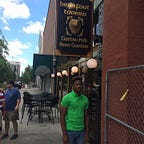Around the world and back again: David Goldiner
By Kyle Mullins
David Goldiner said he likes to think he is the only reporter who covered both 9/11 in New York City and Nelson Mandela’s death in South Africa. He admits he cannot confirm this anecdote as a fact, but given his amount of experience as a reporter, there may be some merit to his claim.
“I know all of the reporters from New York and none of them were over there,” he said. “That was an incredible story.”
Goldiner said he spent around two to three weeks covering the event from the time of Mandela’s death to his funeral for several different publications, but mainly for the New York Daily News.
“That was an incredible experience for a lot of reasons. Mandela was my hero growing up. That was one of the biggest stories of the 21st century and he was one of the greatest towering figures of the 20th century,” he said.
After being was freed from prison in 1990, Mandela spent some time in New York, which Goldiner said he believes is why many New Yorkers responded to the stories he wrote about Mandela after his passing.
Goldiner said when he looks back on his career, he considers this story to be one of the big highlights. He just happened to be on vacation in South Africa when Mandela passed.
“I didn’t know for a fact I was going to to get to cover it,” he said.
Despite having to compete against other larger New York City based publications, Goldiner said he managed to cover a lot of aspects of the story that many others missed, including being able to talk with some of Mandela’s relatives and those who knew him from his village.
This was not Goldiner’s first time in South Africa. After graduating college from Columbia University, he spent some time working as a taxi cab driver so he could save up money to travel overseas.
He ended up in South Africa where he spent a year working for City Press, which at the time was South Africa’s largest black owned weekly newspaper.
Goldiner is now director of digital editor of The Forward, a New York City based magazine focusing on Jewish-American affairs. However, before he took his job at The Forward in 2011, he spent several decades working for papers including The Trentonian and The Riverdale Press.
For Goldiner, being an editor has perks he said he was not able to experience while he was a reporter.
“When you’re a writer you tend to be immersed in one story at a time. When you’re an editor you have more control over the entire news product, the whole package that people see,” he said.
Goldiner said during his time working overseas, one of the most important skills he acquired as a journalist was being able to come into a community as an outsider and try his best to relate to the people despite his status as a foreigner.
“All the things that are happening in whatever country you’re covering, they’re happening for a reason, even if most Americans might not understand why they’re happening or how they’re happening,” he said.
He went on to say it’s important to have an open mind about stories and why people act the way they do. Relating these cultural differences to an American audience can be a difficult task for an overseas reporter to overcome.
“One of the main challenges is that your editor or the audience you have may have preconceived ideas about whatever country or whatever topic you’re covering,” he said.
The goal is to try to get the audience to move past these preconceived notions, and part of Goldiner’s strategy to accomplish this is including details in his stories that make his subjects more relatable.
“I have an eye for detail. That’s one of the key skills that many people don’t have and it’s very important, because when you’re writing a story sometimes the smallest things are the things people focus on most of all,” he said.
In South Africa, the majority of people speak English. However, when Goldiner did reporting in Zimbabwe, he had to pick up a second language, Shona, the most widely used Bantu language in the country. To this day, he said he can still understand the language, although his ability to speak it has diminished.
Even though a large majority of Zimbabweans can speak English, Goldiner said learning Shona enabled him be able to understand the community and relate to them.
Goldiner said being able to have these kinds of experiences when he was younger are invaluable to him, and he would recommend it to anyone who is graduating to try the same thing.
“Do different jobs earlier in your career and don’t be afraid to change careers, even within the field of journalism,” he said. “I resisted being an editor for a long time, even though I like it now.”
